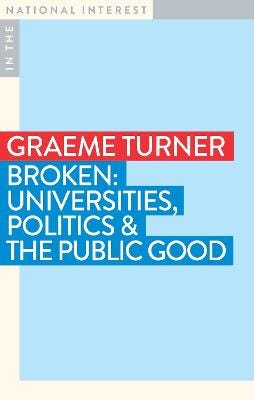Universities are Broken
A short advertisement for Graeme Turner's new book about a Broken system
It is 2.15 on Friday afternoon and I have enjoyed a wonderful day working (on other people’s stuff) in the sunshine. Our resident Australian magpie family have been hovering close by, kings of all the birds who at this stage of winter are markedly hungry. I am enjoying this experience particularly this week, after what was surely *the worst* bout of illness that I’ve ever had this week (which is why my usual weekly post is late…it is being drafted and coming soon, I promise).
I’m interrupting all this gainful pleasure to promote a book, and events associated with it. I don’t know how things are going for universities in your neck of the woods, but I bet it isn’t great. Solidarity to all working in them, especially the myriad currently facing terrible job cuts.
So it is timely that Graeme Turner has just published this book: Broken, which kinda sums up what these deeply flawed, stunningly beautiful and profoundly important institutions feel like right now.
If you live near me, you may like to come and hear Graeme in convo with moi at Gleebooks (the one in Glebe, not the one really quite close to me in the mountains).
Thursday 10th July starting 6:00 pm for 6:30 pm Register Here
Here’s the blurb:
A strong higher education system is fundamental to civil society. The building of knowledge and the dissemination of information is vital to the proper functioning of our democracy. At the economic level, higher education is in the top three of our export industries; international students have become central to the hospitality, retail and agricultural economies; and the country desperately needs well-trained, knowledgeable citizens to shore up its future.
Yet, in February 2024, a detailed review of higher education in this country concluded that the system is broken and urgently needs fixing. The problems that afflict it are legion, including over-investment in international enrolment, an epidemic of casualisation and the burning out of a generation of academics, culture wars over the content and orientation of university research and teaching, the lack of sectoral coordination around the national interest, and the consequences of decades of funding cuts.
In Broken, Graeme Turner provides a reality check for those who imagine the academic life is one of privilege and leisure, laying bare the enormous challenges and lack of hope experienced by many in academia. He unearths the foundations of this crisis, then explains how the solution lies in an overhaul of the one-size-fits-all approach to university funding, the establishment of genuine full-time career paths, and the formation of an independent body to ensure our university system serves the national interest in both teaching and research, rather than the ferocious competitiveness of the marketplace.
Above all, we need to jettison the current economic focus on education, and re-embrace the idea that higher learning is a fundamental public good—and should be funded as such.
Published by Monash University Press on July 1. https://publishing.monash.edu/product/broken/
And the rest of the events if you live elsewhere in Oz:
Canberra. ‘Meet the Author’ in conversation with Frank Bongiorno on July 8, 5.30 for 6.00pm start, Kambri Cinema, ANU. https://www.anu.edu.au/events/meet-the-author-graeme-turner
Sydney: In conversation with Hannah Forsyth at Gleebooks, 6.00pm for 6.30 start, July 10 Register Here
Melbourne: In Conversation with Ben Eltham at Readings Carlton 5.30 for 6.00pm July 15
https://readings.com.au/events/graeme-turner-in-conversation
Brisbane: In Conversation with Roly Sussex at Avid Reader 6.00 for 6.30 on July 16.
https://avidreader.com.au/pages.11730-GraemeTurner-BrokenUniversitiesPoliticsthePublicGood
Adelaide: In Conversation with Justin O’Connor at Ern Malley 5.30 for 6.00pm on July 23 (Further details to follow on Graeme’s blog




From my point of view, as one of those many who realized what was going to happen to the Australian university system over three decades ago, and critiqued the managerialism and commercialization brought in with Dawkins’ “reforms” at the time they began, there’s a certain schadenfreude in seeing figures like Graeme finally get the point. For too long, they objected to our critique, and instead promulgated the “new humanities,” assisted in the collapse of autonomous, discipline-based departments, and prided themselves on their good relations with politicians, etc etc.